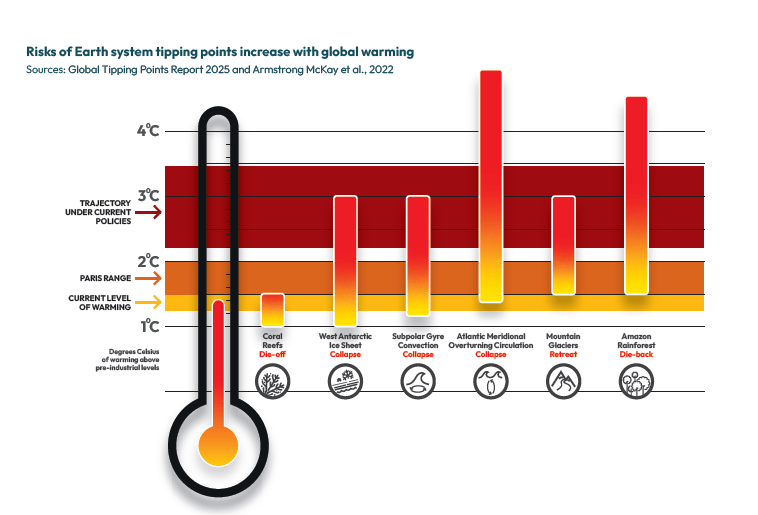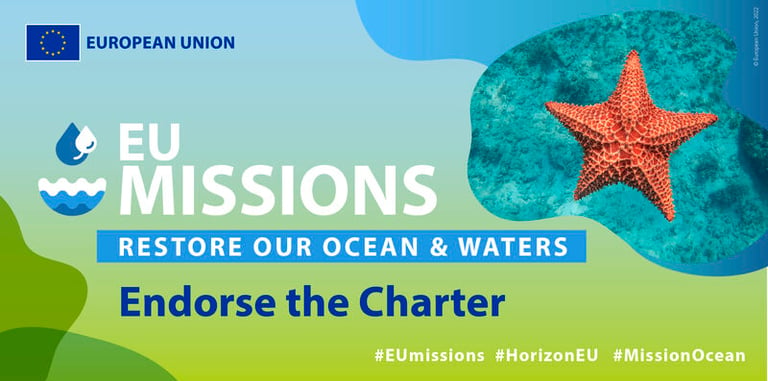Predicting the future by re-imagining the present
Convening the multiple-helix for problem-solving of SHARED environmental challenges FACING the baltic sea region
Passing the 'tipping point' - warning issued by 60 authors from 23 countries and 87 institutions
Thanks to the dire condition of the Earth's coral reefs, the planet has now reached its first tipping point for human-caused climate change, according to the second Global Tipping Points Report..... Read More
10/13/20252 min read


A tipping point occurs when a small change pushes a complex system into an entirely new state — often one that’s irreversible. In the context of climate, these “points of no return” describe the thresholds beyond which the Earth’s natural systems can no longer recover, no matter how much mitigation occurs later. Once crossed, they set off self-reinforcing feedback loops that can dramatically reshape entire regions, ecosystems, and economies. The latest Global Tipping Points (GTP) Report 2025 — a landmark scientific synthesis (download here) — warns that several critical Earth systems are dangerously close to, or have already crossed, their tipping points. These include the melting of the Greenland and West Antarctic ice sheets, the collapse of major ocean circulation systems like the Atlantic Meridional Overturning Circulation (AMOC), Amazon rainforest dieback, and perhaps most tragically, the global collapse of warm-water coral reefs. The report states bluntly: coral reef ecosystems have already crossed their global tipping point. This means that, even if warming were stabilized today, much of the damage is irreversible on human timescales. Coral bleaching events, driven by ocean heatwaves, are no longer isolated crises — they are chronic and compounding. Once vibrant reefs that supported nearly a quarter of all marine life are now shifting into algal-dominated, biodiversity-poor states. The loss of coral reefs isn’t just ecological; it’s profoundly social and economic. Over 500 million people worldwide rely on reefs for food security, coastal protection, and livelihoods. Their collapse amplifies vulnerabilities in tropical nations, threatening fisheries, tourism, and local cultures deeply tied to the sea. The report emphasizes that this isn’t a distant scenario — it’s unfolding now, reshaping economies and communities in real time.
Interconnected Tipping Points - One of the GTP Report’s most urgent insights is the interconnection between tipping points. Coral reef collapse is not an isolated tragedy; it interacts with other Earth systems. Dying reefs reduce coastal resilience, increasing erosion and storm damage. Ocean acidification, itself a result of carbon absorption, further weakens marine ecosystems. At the same time, changes in ocean currents — another tipping point risk — alter regional temperatures and nutrient flows, amplifying coral stress. These links show that crossing one tipping point can trigger or accelerate others, potentially leading to cascading effects across the biosphere. The planet is a network, not a collection of separate parts — and the collapse of one vital node affects the stability of all, producing the domino effect. Despite its sobering findings, the Global Tipping Points Report also highlights pathways for hope. It calls for a “Tipping Points Turnaround” — using social, economic, and technological tipping points to drive rapid, positive change. For coral reefs, that means:
Urgently reducing greenhouse gas emissions to limit further ocean heating.
Accelerating nature-based adaptation, such as mangrove and seagrass restoration, which can buffer coastlines.
Investing in local stewardship and indigenous knowledge, empowering communities that have lived in symbiosis with these ecosystems for generations.
The report stresses that positive tipping points — in renewable energy adoption, regenerative farming, and climate governance — could still steer humanity toward a more stable and equitable future if activated in time.
The story of coral reefs is a warning — and a mirror. A small rise in ocean temperature, once unimaginable, has irreversibly transformed entire ecosystems. But it also illustrates our power to act collectively before other thresholds are crossed. The window to prevent further tipping points is narrow but not closed. The next decade will decide whether we remain passive witnesses to cascading collapse or become active architects of renewal. The reefs may not recover — but through decisive action, the rest of the planet still can.
Connect
Collaborate
info@BalticLivingLab.org
© 2025. All rights reserved.
Views and opinions expressed are those of the author(s) only and do not necessarily reflect those of the European Union or the European Commission.


In Support of the EU Mission Ocean
Created and supported by
Global Skills Network, Estonia,
as a resource hub for the
Horizon sister projects,
three Mission Ocean and Waters
projects funded by the EU’s
Horizon Europe Research & Innovation
Program.




PRO-BLEU


